Ticket sales account for a massive amount of annual revenue, with a figure that is approaching $100 billion every year. A huge chunk of those tickets are sold on the secondary market, which helps to line the pockets of savvy resellers engaging in this game.
However, with recent ticket sales controversies like the debacle with Ticketmaster Taylor Swift’s Eras tour that resulted in a federal lawsuit and some new rules, many of those sitting on the sidelines rightfully have some reservations regarding the ethics and legality of this game.
In this guide, we’ll go over all the nuances including the difference between scalping and reselling tickets, what the legal landscape looks like, how to get started, and to sell your tickets legally.
After reading this, the whole ticket game will be demystified and you’ll understand how you can join the group of people who are profiting as ticket resellers.
Looking for something specific? Jump ahead to:
- Why do Tickets Resell at Higher Prices?
- Ticket Scalping vs Ticket Reselling: What’s the Difference?
- Is Ticket Reselling Legal?
- Complete Guide to Buying and Reselling Tickets for Profit
- Getting Started as a Ticket Reseller
- Top Ticket Reselling Platforms
- How to Price and Sell Your Tickets
- How Much Money Can You Make Reselling Tickets?
- Reselling Tickets: Pro Tips
- Abiding by Laws as a Ticket Reseller
- Find Ticket Reselling Success with Whop
Why Do Tickets Resell at Higher Prices?
The first thing you should know if you don’t already is that tickets regularly sell for more than their initial price. This creates an opportunity for resellers who capitalize on these price discrepancies, and the majority of them are individuals who started from scratch without any insider advantages or connections.
The reason that tickets resell at higher prices is because they are actually inherently priced below the fair market value, in order for them to sell quickly and to ensure that an event will be full, which is the first goal of any event organizer and artist or team that is putting it on.
In addition to the general public, individual resellers make up a good portion of those who buy these tickets at fair value during the time period that they are initially available, which is often a short window that is a good deal in advance before the event takes place.
Whenever someone buys the ticket later, they’ll pay a higher price thanks to the nature of the free market and supply and demand which rewards the early birds. While some may view this as generally unethical, this is no different than how flight prices can increase drastically based on when they are bought, and can be quite cheap at moments when the flight needs to be filled. Although you can’t resell airplane tickets, you can resell tickets to just about any event you can imagine, and you’ve probably purchased tickets at a markup that has profited a ticket reseller at least once in your life, maybe even without realizing it.
Ticket Scalping vs Ticket Reselling: What’s the Difference?
One of the first clarifications that we should make when learning about this game is the difference between ticket scalping and ticket reselling.
While these two terms are often used interchangeably, they have subtle differences:
Ticket Scalping is more associated with practices that can be considered unscrupulous, where individuals are quickly flipping tickets that are often bought in bulk using grey methods such as bots. Scalpers are also known to sell in unregulated ways, such as in person or outside of a trustworthy platform. The sole intention of ticket scalping is to make profits, and it can be known to price out genuine fans from attending the events that they want to go to.
Ticket Reselling is the act of selling a ticket that was legally purchased, and it can be done profitably as well but it is less ruthless than scalping.
A ticket reseller, who might also be a ticket broker, will list their tickets on trustworthy platforms on the secondary market and price fairly but can still make a profit on the difference between the purchase price and the sale price.
Let’s continue with the legal aspects that you’ll need to have in mind when engaging in ticket reselling.
Is Ticket Reselling Legal?
As with the legality of reselling anything, once you own a ticket that you have rightfully purchased, you can legally list it on the free market for them to pay a fair price which might result in you making a profit.
However, the specifics of how you can price and what practices you can use to purchase the ticket will vary by region.
For example, some jurisdictions will allow for ticket resale only if they don’t exceed a certain price increase, for example, 10-20% of the original ticket costs. Some regions have ruled that buying tickets for resell using bots is illegal.
When picking a place to list your ticket for sale, you should always read the fine print of the platform that you’re listing on, as it might compromise the validity of your ticket which will affect both you and the buyer. The specific rules might vary per event, so make sure to check every time before listing your ticket or even before making the initial purchase to ensure you can make a profit.
Examples of potential regional issues include the inability to resell tickets at all for certain events like football matches in the UK or price caps for concert ticket prices in the US.
Complete Guide to Buying and Reselling Tickets for Profit
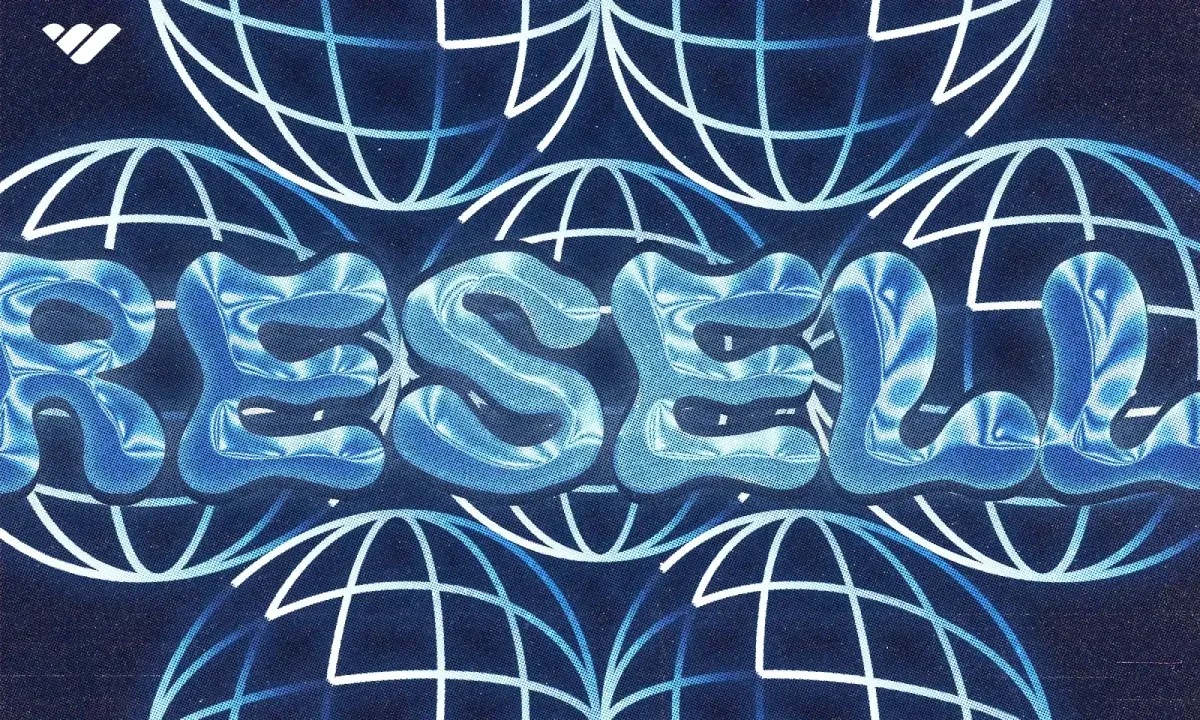
If you want to be on the winning side of getting tickets for any event with the added bonus of potentially reselling them for profit, you can follow this guide, which will cover everything you need to get started, how to find the best opportunities, and how and when to cash out. Let's start at the very beginning.
Getting Started as a Ticket Reseller
Follow these steps if you’re just starting out as a prospective ticket reseller:
Understanding the ticketing market
Before jumping into buying and selling tickets, you’ll want to develop a good base understanding of the general dynamics and the legal landscape of the ticketing market.
This includes recognizing things such as the inherent seasonality for certain tickets–for example, summer is often peak time for music festivals, and winter can be good for some sporting events and indoor concerts.
You’ll want to keep up with current trends in entertainment and sports to know when and where the hottest events are happening that will sell out.
Remember that the profits from the ticketing market come from a demand that exceeds the supply, and this will only be the case for events that are significant for their relevant fanbase which might not register unless you are in the know of what niche fanbases like.
Get familiar with the official websites where you can buy specific tickets as well as the platforms and sales outlets that you can use to resell them - which we will dive into later in this guide.
Setting up your ticket reselling business
Once you’ve done your research and gained an understanding of the market and what niches to target and when, you’ll want to set up your business officially.
Be sure to remain compliant with any local legal considerations which might include correctly registering your business or obtaining a license.
You’ll also have to keep in mind the financial setup, which will include funding a dedicated business bank account to run all expenses and profits through. Create a business plan and forecast an initial budget and expected revenue so that you can know what your risk tolerance is like and what financial goals you can you set and expect to achieve.
Using tools and technology
The reason that ticket reselling is profitable is because that it’s to get a ticket if you don’t have anything more than luck backing your odds.
Gaining access to tools, groups or software such as a ticket reselling Discord server or even a bot where legally permissible will give you a competitive edge over everyone else who is hoping to flip tickets for a hot event.
Finding opportunities for tickets to resell
Now that you’ve got a good understanding of the landscape, have formally registered a business and have some tools to give you an edge over your competitors, you’re ready to seek out opportunities to find tickets to resell.
Remember to start small and focused at first. Find and wait for an upcoming event that will likely sell out and have a profitable aftermarket. No need to shoot for once-in-a-lifetime events and headliners at first as these can be quite hectic. You can simply start with an event that has cheap tickets and generates a modest profit or even a break-even for your first sale just to get used to the whole process.
Buying your tickets
Successfully buying your tickets is more nuanced than one might first think, and understanding this complexity is a skill that ticket resellers are paid for.
To see the ticket-buying process through the lens of a professional reseller, you’ll first need to know the different types of tickets and how they are sold.
- General sales
Most event tickets are open to the public at a set time and date in a general sale format. These can sometimes cause a frenzy as they are first come, first serve and site traffic can get throttled causing a delay or failure in loading and the potential of striking out as general sale tickets for a hot event can sometimes totally sell out in less than a minute.
Using multiple devices and having high-speed internet can increase your chances at grabbing a ticket at its initial value so you can flip it for more to anyone that struck out. - Presales and special access tickets
Sometimes events will allocate a set number of tickets to presales or special access. For the most part, getting a presale or special access ticket isn’t as time limited as a general sale ticket. Instead of speed, you simply need permission to buy these, which will vary based on the event and how the tickets are being sold.
One way of qualifying for presale tickets is by holding a certain credit card such as American Express, Citi or Mastercard, which sometimes offer both presale tickets and preferred seating through partnerships with platforms like Ticketmaster and Live Nation. Some people open up multiple credit card accounts with the goal of securing multiple presale tickets.
Additionally, joining an artist fan club through their official site or mailing list can give you a unique presale code or link to use before the tickets are available to the general public.
Secondary markets
Many event tickets are sold on secondary markets, oftentimes by third parties which includes individual ticket resellers and ticket brokers.
As a ticket reseller, these secondary markets are where you’ll make your profits. Well-known platforms such as Ticketmaster, Stubhub, SeatGeek are examples. We’ll dive into each of these more later.
When it comes to the process of actually buying your tickets, you’ll want to check first if you have a chance of getting into a presale using the methods previously mentioned. If not, you can mark the date of the general sale and try your luck as a normal buyer, which will mean you’ll be competing against bots and bulk buyers, so your best bet as a serious ticket reseller will be to figure out if and how you can legally join the side of those who are getting profitable tickets successfully.
Finding big ticket resale opportunities
Top ticket resellers are able to identify the best reselling opportunities so that they can efficiently focus their efforts to the most profitable activities.
While there are many events and ticket sales, not all of them have a strong secondary market, and some have none at all.
In order to find the most profitable ticket reselling opportunities, you’ll have to consider several factors, including:
- The popularity of the artist or team
- The significance and frequency of the event
- The historic general sale price and the amount of price increase on the aftermarket
- The size of the venue–smaller ones, like Madison Square Garden, will sell out more quickly
- How quickly the event might sell out based on demand and venue size
These are the major factors you’ll need to consider before reselling your tickets online.
Top Ticket Reselling Platforms
Once you have tickets that are good for reselling, you’ll have to sell them online and remain both legally compliant and profitable while doing so.
This starts by knowing the different platforms and choosing the one that is best for your situation.
When choosing your platform, you need to understand the individual fee structure as well as the rules that a specific platform will have. Here are some of the most popular that you can use:
1- Ticketmaster
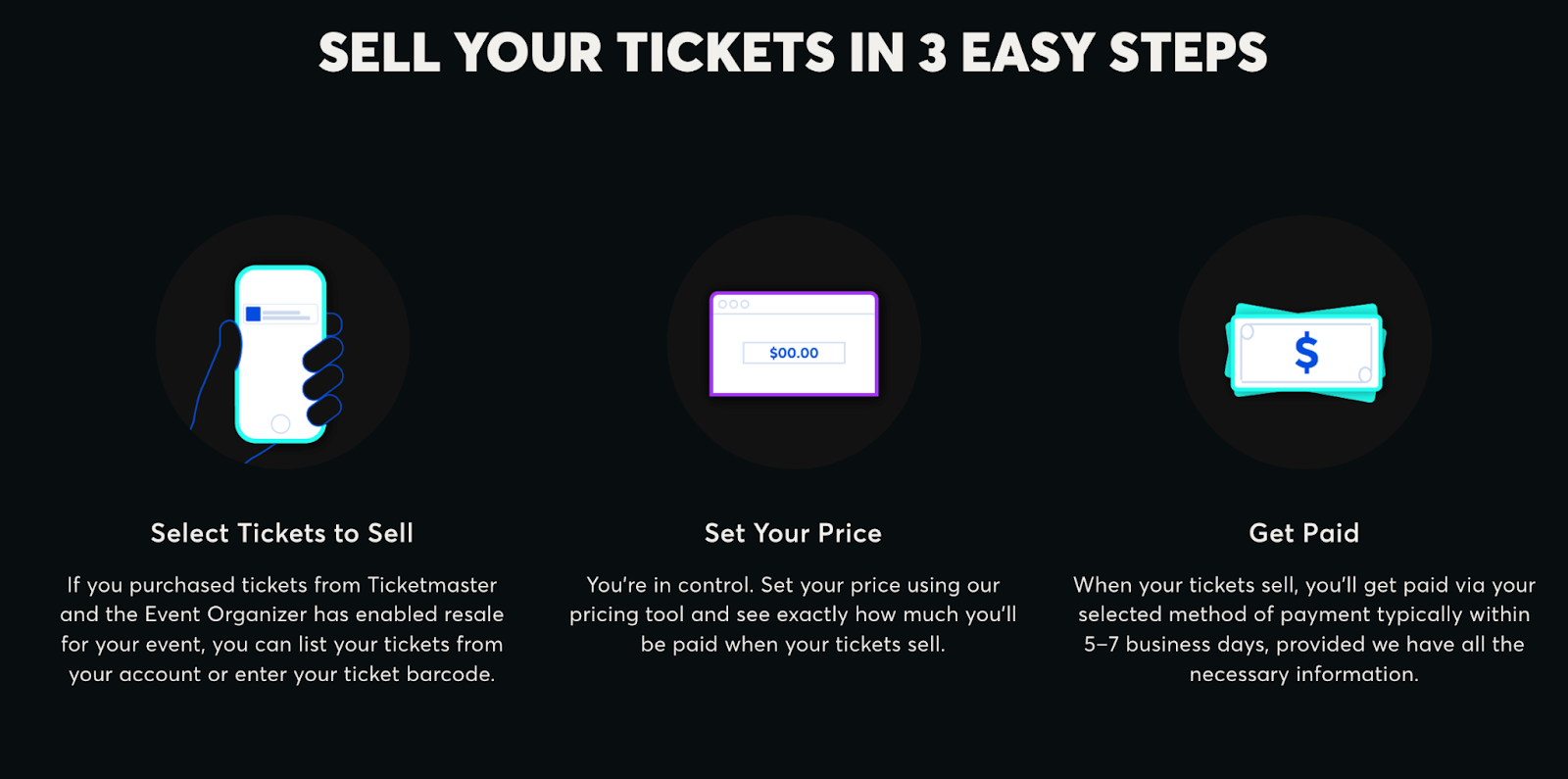
Ticketmaster is one of the most popular online ticketing platforms for both consumers and resellers.
The selling process is fairly simple, although the platform comes with some rules and an opaque fee structure.
Selling on Ticketmaster:
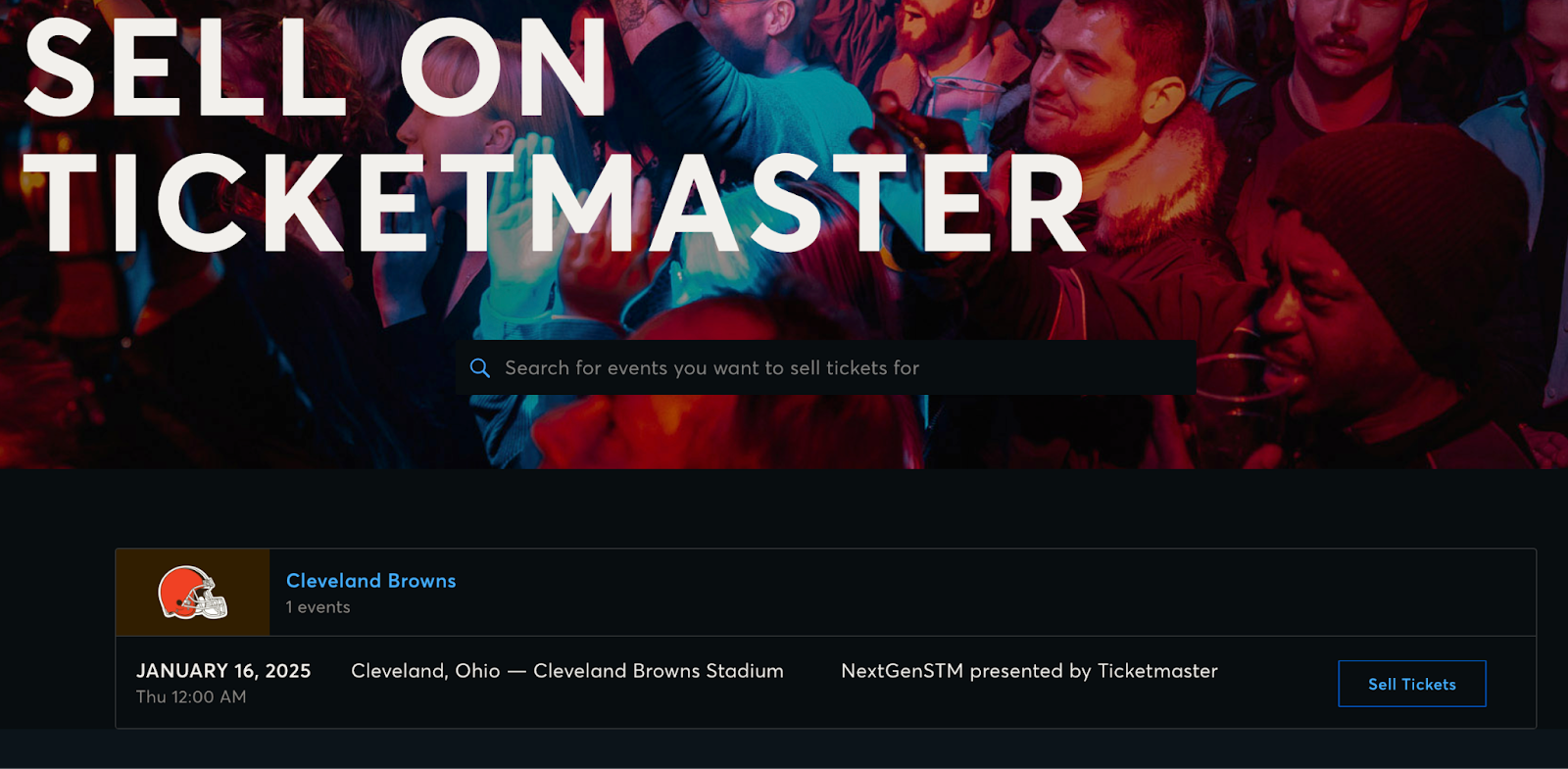
Selling on Ticketmaster is fairly straightforward, with an easy search function that allows you to find which events are on their platform.
Before selling tickets on the platform, you’ll need to have them in your account. While other platforms allow you to upload a barcode or PDF, Ticketmaster generally only allows you to sell tickets that were purchased on Ticketmaster. This is because of their 100% authenticity guarantee for any ticket sold on their platform.
You’ll also want to double check that you’re able to resell a ticket when buying it on Ticketmaster, as some events are restricted for resale.
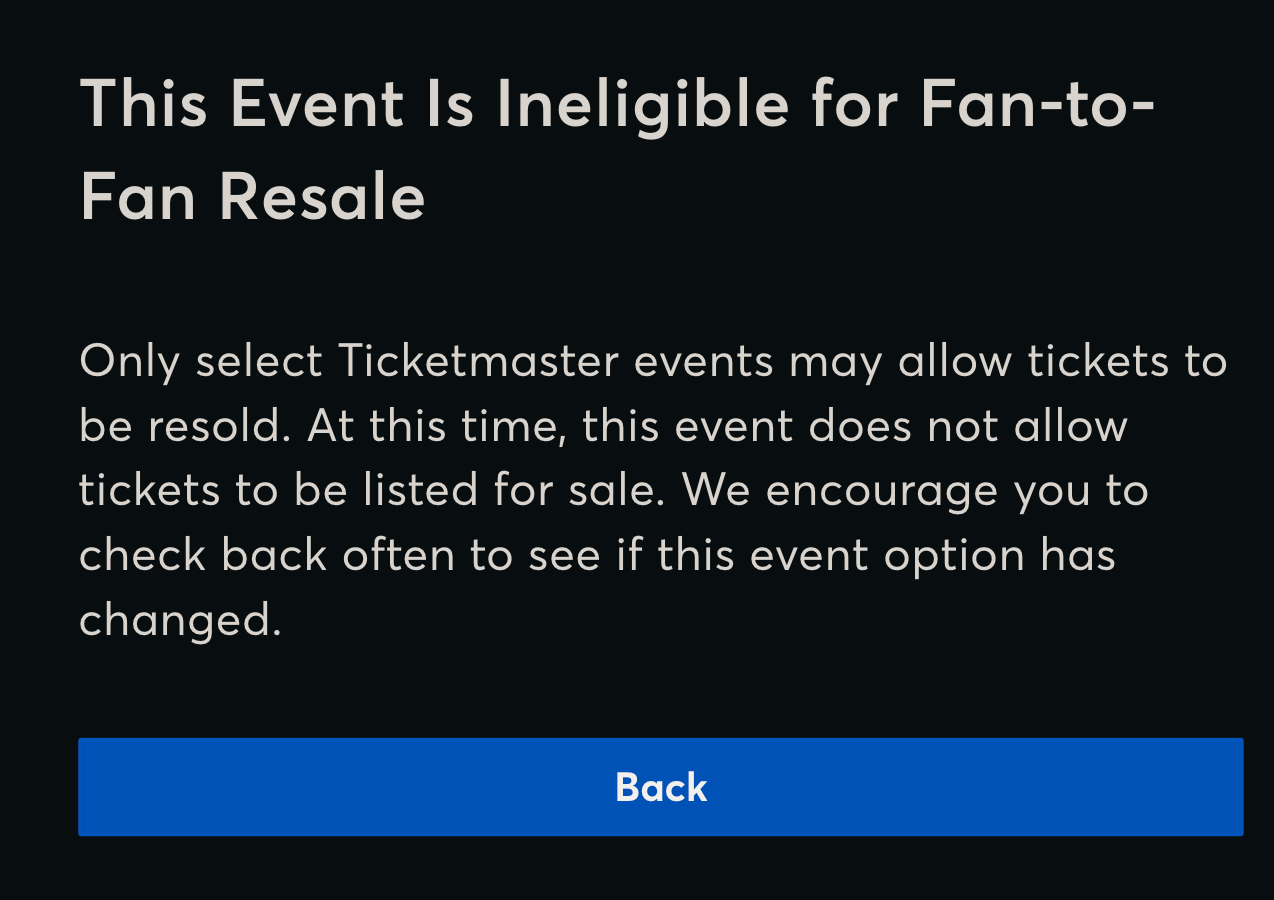
You can also see if it is possible to sell a specific ticket using a barcode before buying or listing it by searching the event first and then going through the steps to list it.
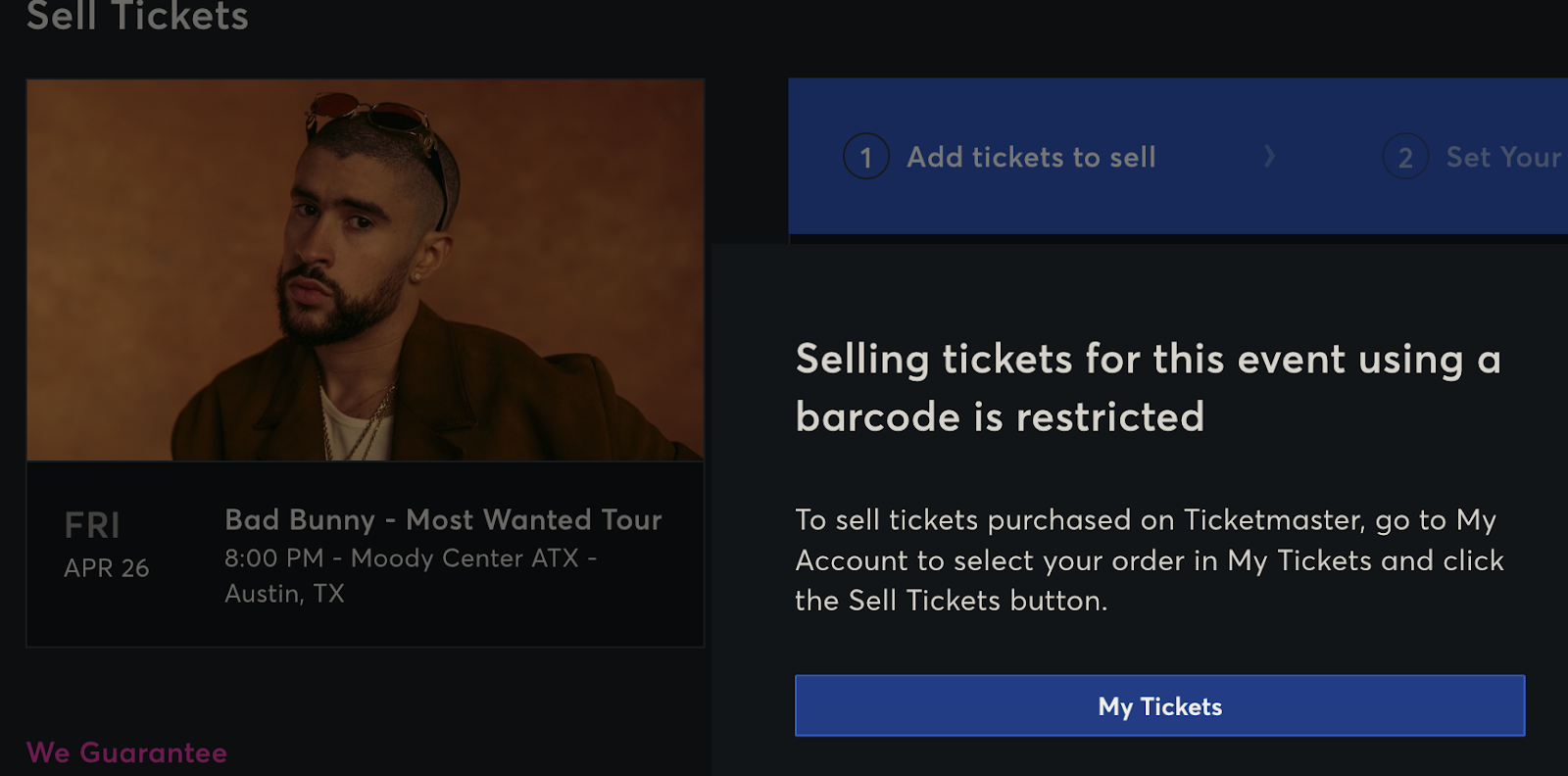
Ticketmaster Fees:
There is no fee to set up an account or to list a ticket, however, the platform takes a commission which varies per event. You won’t know the exact fee until you list the ticket for sale, and it ranges between 10-15% of the final sales price of your ticket.
You can get paid by Ticketmaster through various methods including direct deposit to an account or debit card, Payoneer, and PayPal.
2- Stubhub
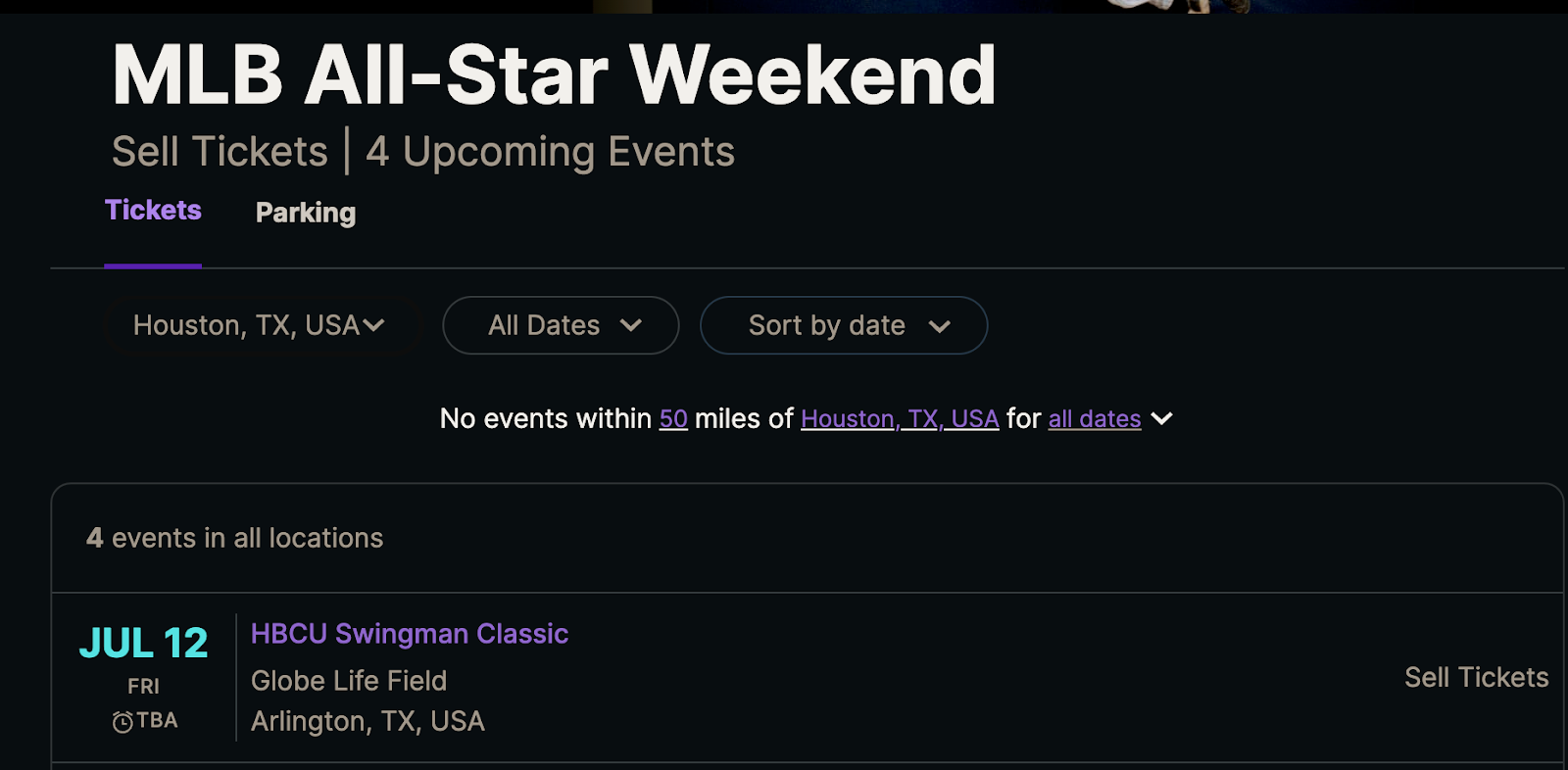
Stubhub is another popular ticket exchange and resale platform which was founded in 2000.
The platform is based in New York and primarily serves the US and Canadian markets.
Selling on Stubhub:
Compared to Ticketmaster, selling on Stubhub is faster with more relaxed requirements.
Just about every event allows you to sell using a barcode, which you don’t even have to enter immediately when creating your listing.
Stubhub Fees:
Some perks of selling on Stubhub is being able to see how many people are viewing an event and being able to see the selling fee at the moment of creating your listing, which is typically set at 10%.
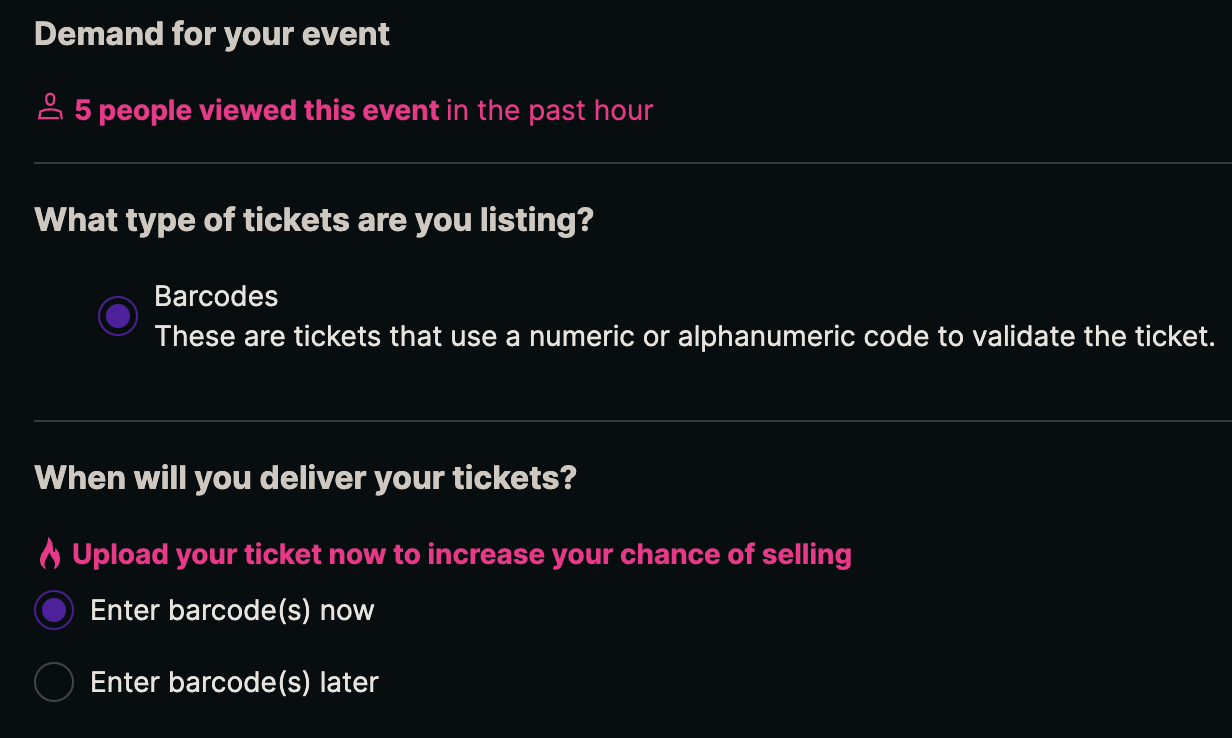
You can get paid for your Stubhub ticket sales through PayPal, direct deposit, and a Payoneer prepaid MasterCard.
3- Vivid Seats
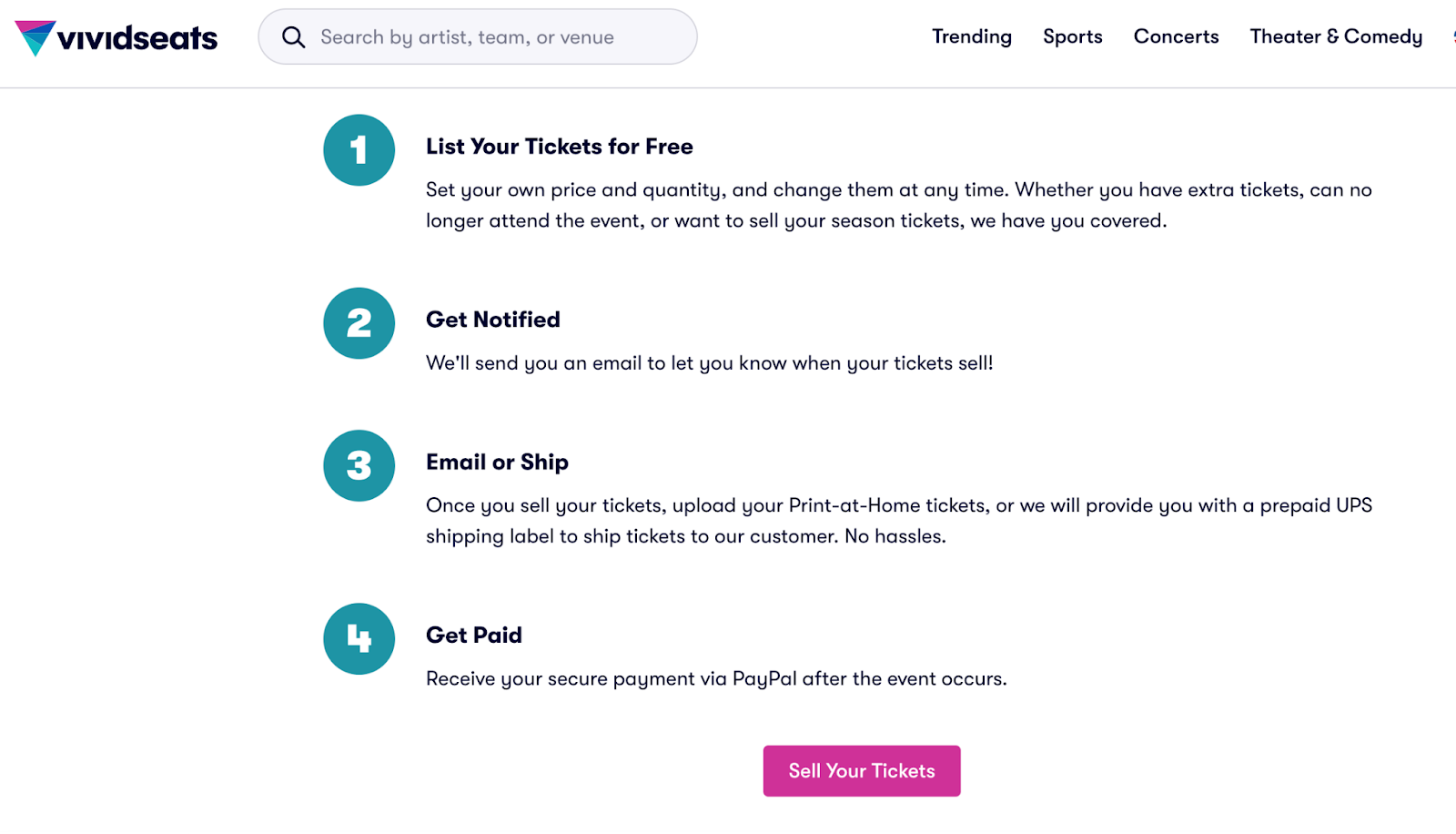
Vivid Seats, which was founded in 2001, is a ticketing platform that is reseller-friendly that serves the United States and Canada.
You can buy and sell tickets to nearly any type of event on the platform, including most concerts and sporting events.
Selling on Vivid Seats:
Vivid Seats caters specifically toward resellers, offering an easy selling process that allows for multiple types of tickets and delivery methods including physical tickets.
You can simply start by searching the event to see if you are able to sell it on the platform, and then you can enter all of the details manually without using a barcode or uploading a PDF as many other platforms require.
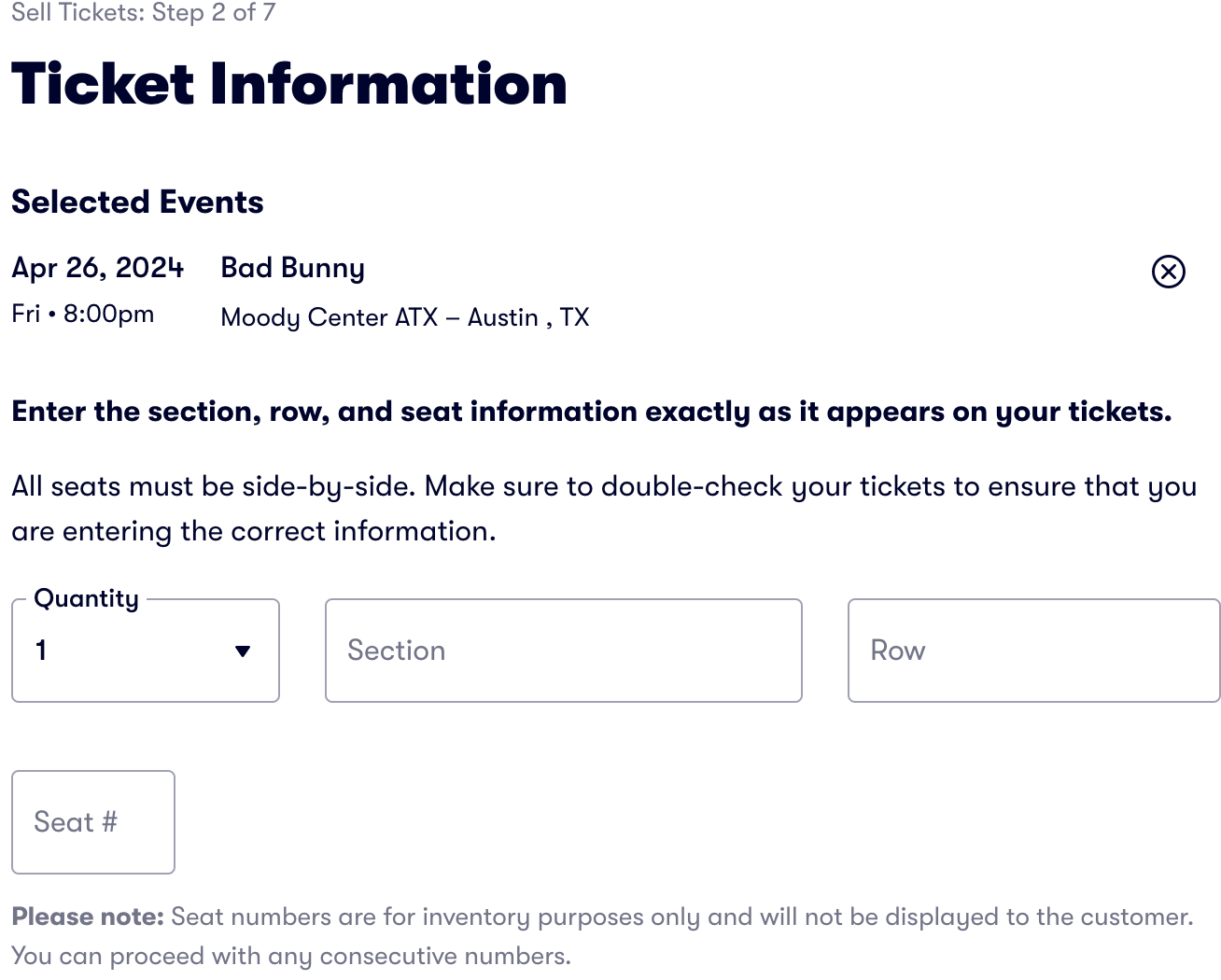
Vivid Seats also has perks for high-volume sellers, including a Super Seller status which buyers can see and trust.
Once you exceed $10,000 in volume, you’ll also be eligible for SkyBox, a totally free cloud-based point-of-sale and dashboard which will allow you to manage and broadcast your available ticket inventory across multiple platforms, including Ticketmaster and Stubhub.
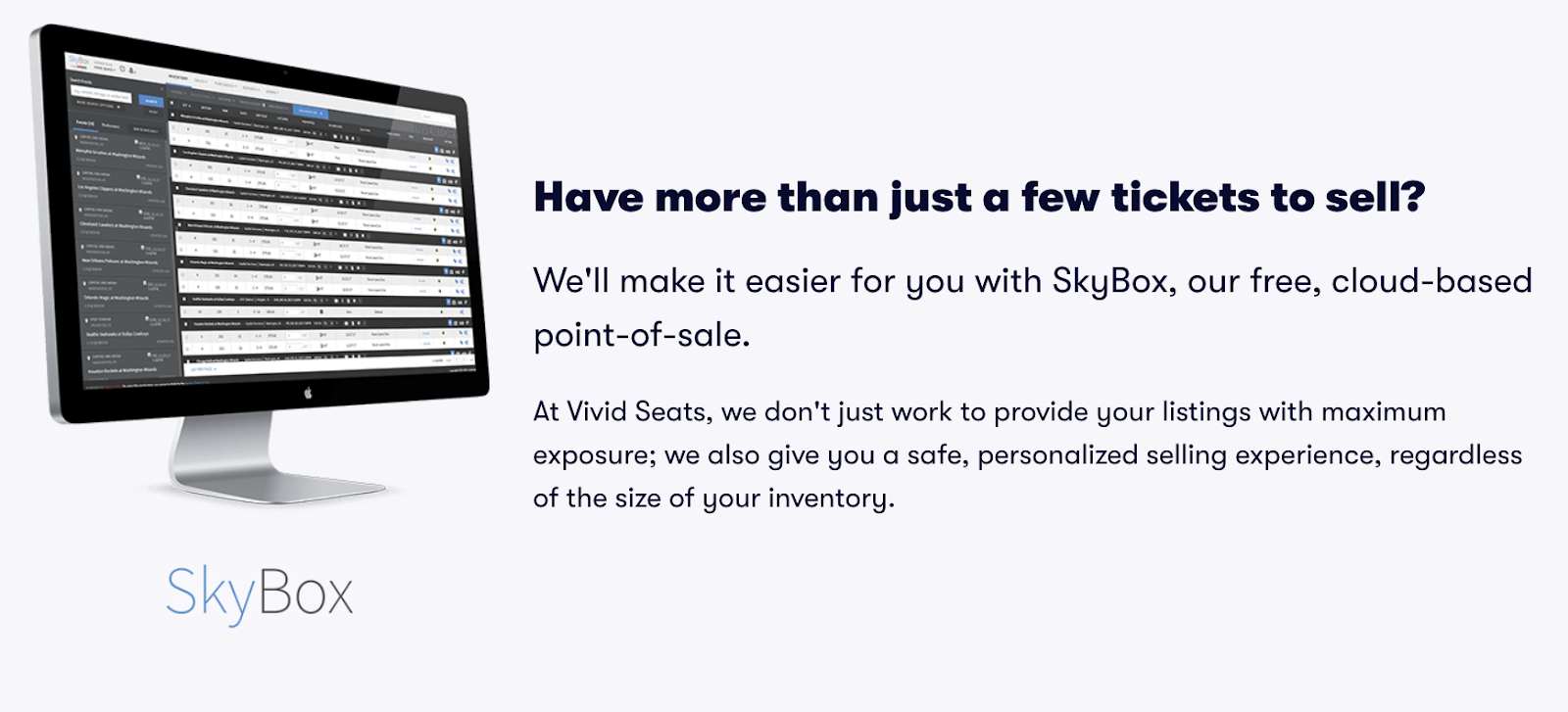
When you make a sale, if your ticket wasn’t uploaded on the platform, you’ll need to complete the delivery method as instructed before you get paid.
Vivid Seats Fees:
Listing tickets is free, and Vivid Seats takes a 10% fee from your ticket sale price. One of the downsides of Vivid Seats is the payout method, which is currently limited only to PayPal.
4- SeatGeek
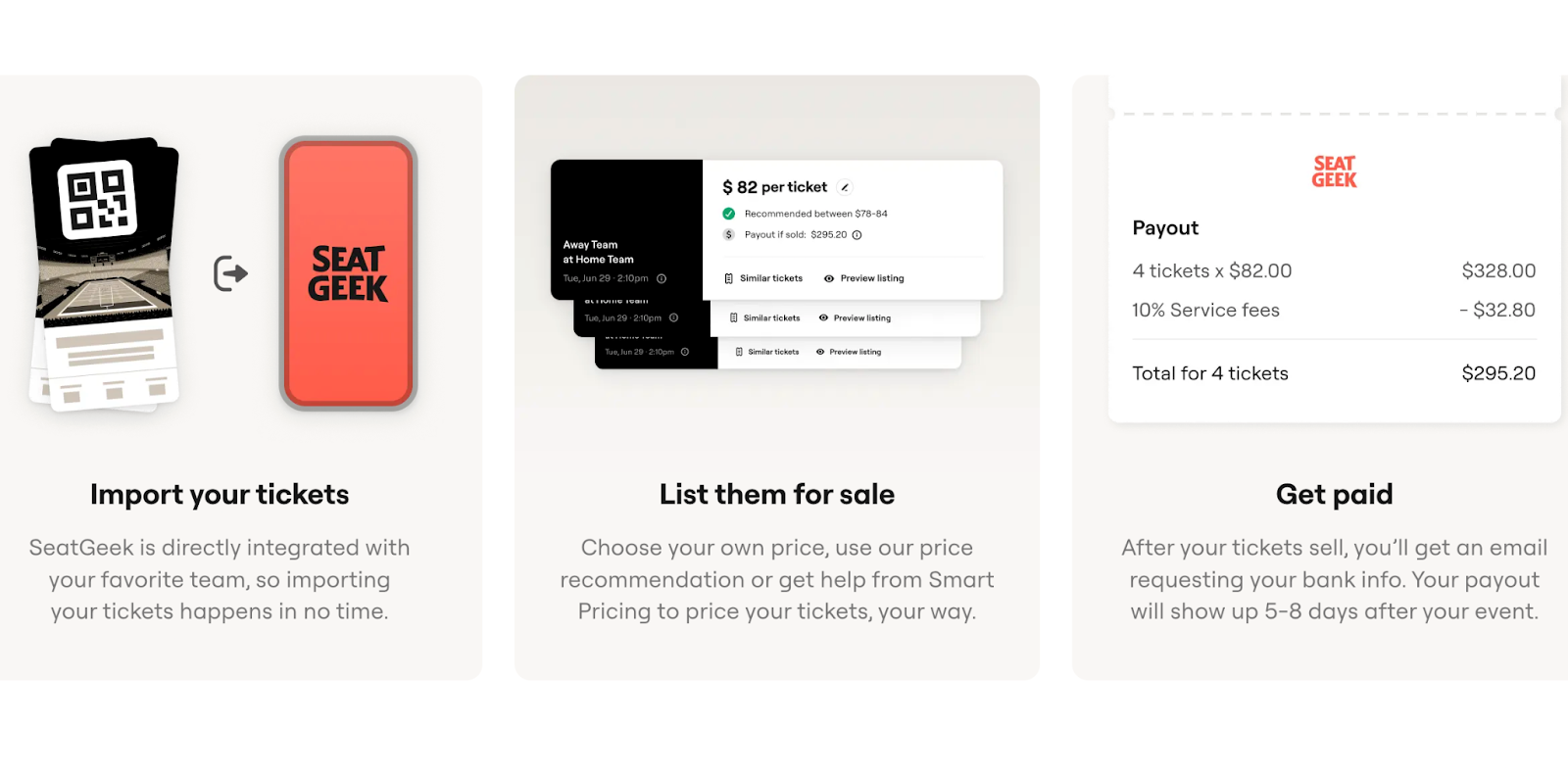
One of the newcomers to the online ticketing world is SeatGeek, which was founded in 2009 and has recently gained traction with official partnerships with major organizations such as the NFL and NHL.
Selling on SeatGeek:
Selling on SeatGeek is incredibly fast and easy if you already have an account with one of their partners, which includes the NFL, MLB, NHL and NCAA. You simply have to link your account and then you can see any tickets you have purchased through them to choose and list on SeatGeek.
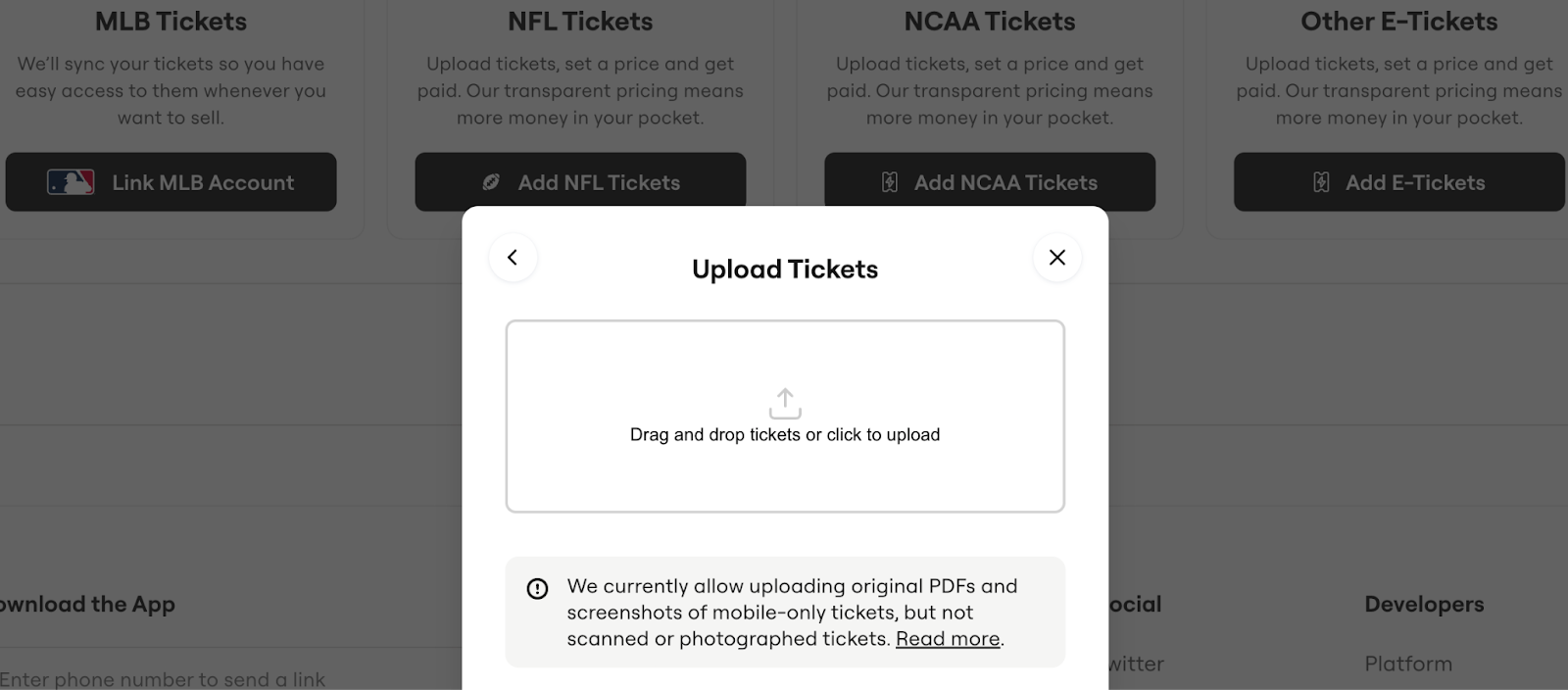
Before making a listing on SeatGeek, you’ll need to have added a payout method to your account, which needs to be a bank account. SeatGeek also asks you to specify whether the bank account belongs to an individual or a business.
One unique feature that SeatGeek has is its Smart pricing, which gives a suggestion for the best price based on customizable settings, for example, if you want to sell quickly or for a higher profit.

SeatGeek Fees:
The payout fee is set at a flat 10%, and there is no fee to list or maintain a SeatGeek account.
How to Price and Sell Your Tickets
As ticket reselling is a free market, you’ll be able to choose your price, but this will take some research to make sure you bag a profit while at the same time selling at a fair market rate.
You’ll want to price your ticket right in order to make the most out of this business:
Dynamic pricing
As a ticket reseller, you’ll be profiting from the dynamic pricing which platforms use to sell tickets. Dynamic pricing means that ticket prices fluctuate based on demand, and you can take advantage of this by having your tickets listed whenever the demand and thus the prices are high and choosing the exact price that you want to sell at.
When pricing your ticket, you’ll want to have a good idea of what the current going rate of a ticket is. Be sure to check the prices of competing sellers when listing your ticket, and if possible, see how many other tickets there are and the rate at which they are selling out.
Prior research on statistics on similar historic events of that artist and venue might help you to get a good understanding of how to price your tickets and if they’re a good idea to buy to resell in the first place.
Bulk buying and selling
One way to increase your inventory and revenue is to get as many tickets to an event as you can in bulk. Some ticket resellers resort to using bots in order to achieve this goal, however, you need to do research on the legality and viability if you intend to use this strategy, as some sites will cancel all tickets purchased by bots.
You can also open up several accounts manually and use them all to purchase tickets for either presale or a profitable general sales price.
Being inside of certain circles will also give you potential access to wholesale tickets that you’ll be able to mark up individually.
One simple strategy of using the bulk buying mentality that you can apply to sporting events is to buy a season ticket for a team and resell tickets to individual games for profit, which will vary based on the demand of the game.
Whenever dealing in bulk, you’ll want to make sure the event has enough hype so that the demand and pricing of your tickets remains consistent until you have sold every single one of them.
Brokering
If you’ve established a history and reputation as a ticket reseller, you can potentially get into brokering.
As a broker, you’ll source tickets from various marketplaces and then sell them on one platform or underneath your company name. Your reputation will allow you to serve a group of customers who trusts you to deliver the tickets and a price that is both profitable to you but still fair to them.
There are various ticket broker associations that you can join to learn more about establishing yourself more formally in this business.
How Much Money Can You Make Reselling Tickets?
Reselling tickets can prove to be quite lucrative if you have the right strategy, tools and connections.
A recent example of a profitable ticket reseller is Shiraz Mawani, who stumbled into ticket reselling in 2014 while he and his friends were hoping to offset the high cost of an NHL playoff game ticket by reselling tickets to the same game.
He was able to sell a few tickets and have enough profit to nearly cover the cost of his initial ticket, so he was hooked.
Today, his business has grown to do six figures in monthly sales, with around $30,000 in take home profits after all expenses. 65% of his sales are attributed to sporting events, with remaining 35% to concerts, Broadway shows, comedy and other miscellaneous events.
He attributes his success to using multiple platforms to buy and sell tickets and doing extensive price research and forecasting to remain profitable.
While Mawani represents an outlier in the context of an average ticket reseller, he shows what is possible if you have the drive, do the research and execute a well-planned strategy.
As a starting ticket reseller, you can generally expect to make an average return of between 10-50% of the money you invest, which means that if you put $1000 into ticket reselling, you’ll probably pocket between $100 to $500.
Reselling Tickets: Pro Tips
Here are some pro tips to keep in mind if you want to get started as a ticket reseller:
Maximize profits and sustainability with tools and research
As with any business, ticket reselling relies completely on your profitability and how consistently you can sustain profits over an extended period of time.
The most profitable ticket resellers not only use extensive research based on historical data from their own sales, they often utilize ticket broker software, such as Skybox.
This will allow you to quickly view statistics regarding the likelihood of you making profit on a specific event beyond the stats that are visible to the general public on the aftermarket platforms.
You’ll also be able to list on multiple platforms at once at different price points and give yourself the best chance for making the most profitable sale with this software.
Keep thorough records and track analytics
Having your own data to make independently informed decisions is a practice that all professional ticket resellers use to get and keep an informational edge.
Some key statistics that you should track in a spreadsheet include details about the event, the purchase price, sale price, overall profit, the time it took to sell, and averages if you’re dealing in multiple quantities of anything.
As time goes on, you’ll have more accurate historical data that wil help you to make informed decisions quickly and spend less time on research every time there is an event that might have tickets that you can resell.
Diversify your events and investment strategy
While you can narrow your focus and develop expertise by specializing on a certain area, such as NBA events, you’ll be subject to seasonality and dramatic variability and an overall inconsistency if you simply stick to one realm.
Ticket sales in general are subject to seasonality in individual niches, but as a whole, people are always buying tickets for something. Spreading your purchases between music concerts, sporting events, annual festivals, and once-in-a-lifetime headliner tours will allow you to establish a more evergreen business.
Stay informed and Network
Keeping up to date with all news is important as a ticket reseller. Not only will this allow you to find out where and when the latest hot events and their tickets are, you’ll be able to keep up to date with any of the current rules and regulations of the industry.
As a ticket reseller, one of your top priorities will be to stay compliant in a constantly changing environment.
Abiding by Laws as a Ticket Reseller
In 2024, following the aftermath of Taylor Swift Eras tour which resulted in exorbitant ticket prices on the aftermarket and unhappy fans that sat online for hours hoping to score tickets only to strike out, regulations surrounding tickets changed and potential punishment increased.
One of the most notable recent developments in this realm of legality has been the crackdown of the use of bots to bypass purchasing systems and buy multiple tickets, with several states including New York and Illinois enforcing fines or even criminal charges. Additionally, several states and regions have set laws that limit the markup percentage that resellers can add to the face value of the ticket, which might be as low as 7% in some regions.
Be sure to check which laws apply to you based on your local jurisdiction before getting involved.
Each ticket reselling platform will also have its own rules that you must abide by, so be sure to read the fine print and follow instructions exactly so that you can remain compliant and increase your reputation as a seller. Be sure to take these seriously, as some ticket resellers can even get blacklisted from violations of terms even if they seem to be unreasonable.
It’s worth noting that these rules and regulations are in a constantly evolving, so having a reliable resource that will give you the latest info is a must.
Find Ticket Reselling Success with Whop
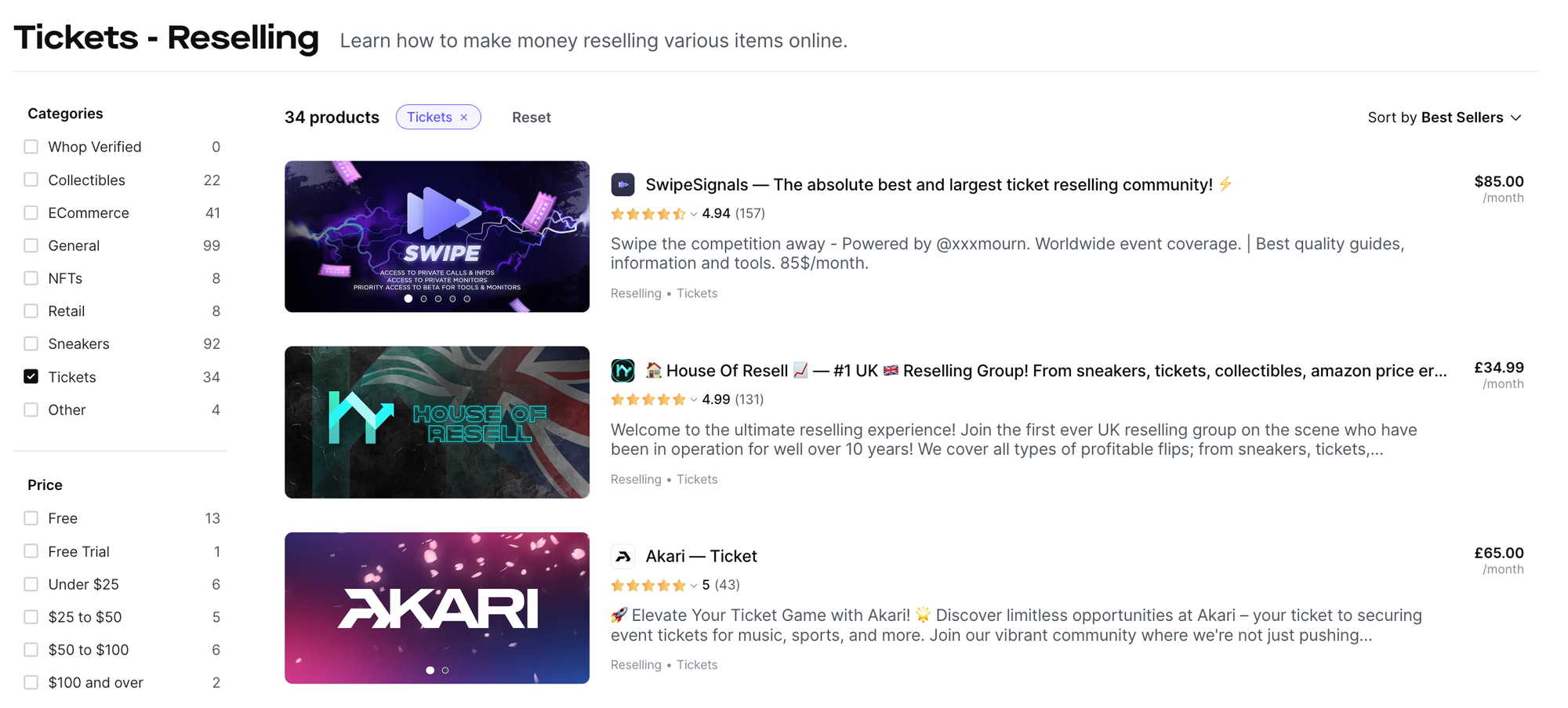
Ticket reselling is not for the faint of heart or for those who want a chill side hustle. For every ticket reseller that makes money, there are many that end up having to sell tickets at a loss or strike out altogether at getting hyped tickets at initial face value.
It’s a complex game as it requires high-level nuanced knowledge and experience in order to succeed consistently beyond making an occasional flip for one sold-out event that you just happened to luck out on getting a ticket for.
However, for those who are willing to put in the work and gain the expertise and execute on it, a cool side hustle or even full-time income awaits.
If you want to shortcut your journey as a ticket reseller check out Whop’s collection of private communities that are dedicated to the art of reselling, where you can learn the tips and tricks of the trade from the best in the game. Don't go it alone - join a ticket reselling community today!
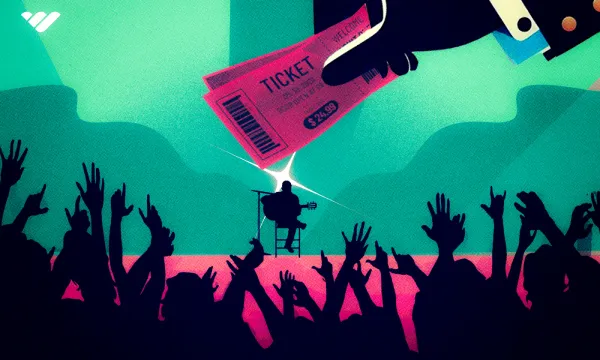

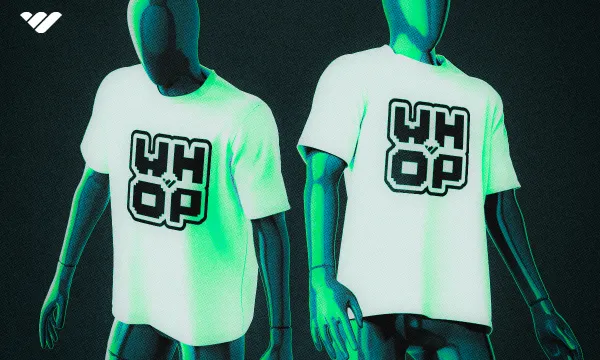
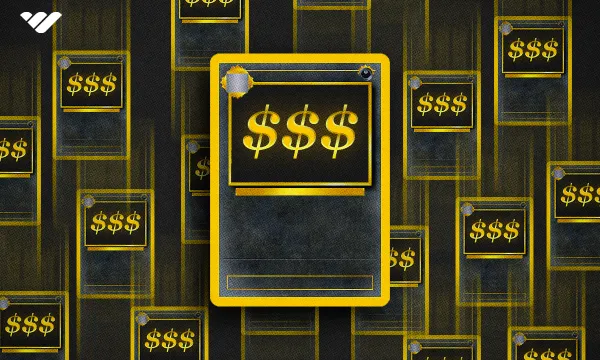
![Top 18 Best Sneaker Reselling Discord Servers [2024]](/blog/content/images/size/w600/2024/01/sneaker-reselling-discord.webp)
